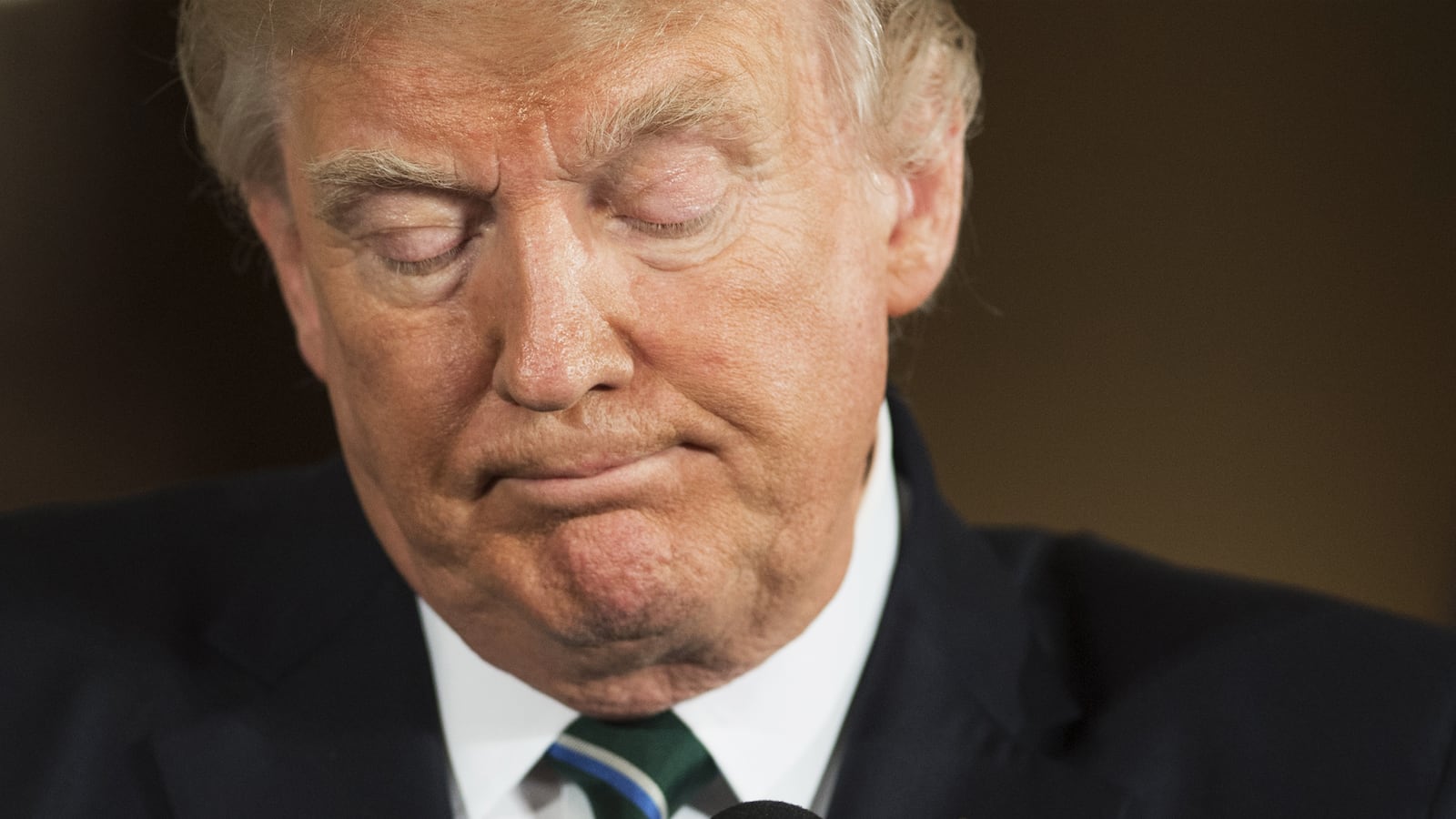It’s all well and good for Paul Manafort to spend 15 years in prison for money laundering, and Rick Gates to plead guilty to cut a deal, and Alex Van Der Zwaan to miss the birth of his first child because he lied to the FBI.
But it would be an injustice if, once again, those around the president suffer and he is left unscathed. He was the beneficiary of the highly questionable Russian contacts his campaign made and desperately tried to keep secret leading up to the 2016 election, which speaks of collusion and much worse. Trump couldn’t have chosen two top advisers with more contacts with the Kremlin than campaign manager Manafort and national security adviser Michael Flynn. He could hardly have praised Russia President Valdimir Putin more. And he could have hardly benefitted more from Russian interference than to win.
Of course, there’s no law against Trump liking Putin; unseemly yes, illegal, no. But a veteran Washington former federal prosecutor who served during both the Clinton and Bush administrations believes there is a strategy that Mueller is quietly pursuing and that explains his actions so far.
Seth Waxman, now a partner specializing in white-collar crime in Dickinson Wright’s Washington office, has a theory of Mueller’s case, which requires no novel reading of existing law to find Trump broke it. It employs the main weapon any federal prosecutor uses to police public corruption. It is Title 18 United States Code, section 201 that specifically makes it a crime for a public official to take “anything of value,” a bribe, in exchange for government action, which can be prospective.
Note that above I wrote “public official.” That’s because the law is generally wielded against public officials. Problem: Mueller is investigating conduct before Trump became one. Enter Waxman. He points out that in 1962, Congress extended the bribery law to cover activity prior to the assumption of office. It did so, he says, in order to close a “loophole” afforded those “who assume public office under a corrupt commitment.” The upshot? Trump became covered by 18 USC not when he was sworn in but as of July 21, 2016 when he became his party’s nominee in Cleveland, Ohio.
What we know of Mueller’s strategy so far is consistent with leveling charges under the bribery statute. This is not to say Mueller is going to indict Trump. He would need an exception from a Justice Department rule, which advises against it. But neither is he likely to send a report laying out grounds for impeachment as former independent counsel Ken Starr did against Bill Clinton relying solely on perjury and obstruction of justice without a finding of an underlying crime.
The bribery statute requires a finding of a quid pro quo, a this for a that. The quid is obviously Russian meddling in our election—a given to everyone but Trump himself—which worked to his everlasting benefit. Thus Mueller’s focus on the summer 2016 meeting at Trump Tower, the one Trump’s senior team of Donald Jr., Jared Kushner, and Manafort had with Natalia Veselnitskaya, a prominent Kremlin lawyer. This was the meeting former chief White House strategist Steve Bannon called “treasonous.” When it became public, Trump was so concerned he got uncharacteristically involved in the details of defending it, drafting a statement, which said the meeting was simply about “adoptions.”
It wasn’t at all. It was an offer of “dirt” on Hillary Clinton which Don Jr. eagerly accepted, responding, “I love it.” The mere contact, Bannon said, should have prompted an immediate call to the FBI. But Trump was too soft on Putin to see the Russian contacts for what they were and thought he could hide behind the adoption excuse. In any event, Trump welcomed Russian involvement (“Russia, if you’re listening, I hope you’re able to find the 30,000 emails that are missing”) not to mention Trump’s hope that WikiLeaks would turn its attention to Democrats. He wasn’t joking.
Trump never got Hillary Clinton’s personal emails but he got a systematic and sophisticated effort to undermine his opponent on social media, the reach of which we only dimly understand, and, according to U.S. intelligence, a successful hacking by Russian military intelligence (the GRU) of the servers of the Democratic National Committee and the email of Clinton campaign chair John Podesta, which were handed over to Wikileaks to be published. Podesta’s email set off the rumor a few days before the election that Podesta and Clinton were part of a satanic cult enslaving children in the basement of a Washington pizza parlor.
Proving the quo specifically is hard but for a bribery to succeed, the act of returning the favor does not have to be completed, especially in the case of a candidate who can’t deliver until later. Trump repeatedly signaled his willingness to warm up the country’s cold war with Putin. When it was pointed out that he was praising an enemy of the United States who kills his political opponents, Trump retorted that we kill people in this country too. Trump had his own web of connections to Moscow, from the Miss Universe pageant to business enterprises that Manafort and Flynn were only too happy to enlarge. Kushner hoped to open a backchannel to Moscow once he was in charge of world peace. Manafort already had strong ties to various oligarchs and a line into Putin (a version of which Kushner wanted to establish once in the White House) and slipped in a Russia-friendly clause on Ukraine into the GOP platform.
It could be a coincidence, but Veselnitskaya, the Kremlin lawyer who was at the Trump Tower meeting, had long been fighting a money laundering case in New York and suddenly won a favorable settlement after Trump’s election. Most significantly the lawyer wanted relief from the Magnitsky Act, which imposes harsh monetary sanctions on senior Russian officials, a wish being fulfilled by inaction on Trump’s part. During the transition, Flynn was overheard on an intercept advising a Russia official to just hold tight and not overreact to Obama’s sanctions because help in the form of a Trump presidency was on the way. And it has been. Congress overwhelmingly voted to impose new sanctions on Russia. But Trump has yet to bring any.
Even as more and more in his party concluded Russia meddled, Trump preferred to call the investigation a “witch hunt” and cite Putin’s “feelings” that there had been no such interference well into his presidency. While Trump has no problem insulting allies like Britain’s Teresa May and Germany’s Angela Merkel, he kept Putin close, abandoning his seat at a formal G-20 dinner to go sit beside him, like a teenager at lunch in middle school. Just last week, Trump’s own FBI Director Christopher Wray testified that Trump had yet to ask for an investigation of Russia’s meddling although he was concerned enough to have started one on his own.
It took a 13-person indictment against the Russians to pry the slight admission out of Trump that the intelligence community correctly concluded there was an “anti-U.S. campaign.” His response was not to reconsider sanctions. Not at all. To Trump, the indictments didn’t implicate him; they incriminated Barack Obama. To prove his point, he ordered Attorney General Jeff Sessions to launch an investigation into why, if interference was such a problem, Obama didn’t do more. This ignores that Obama sanctioned four Russian individuals, five agencies including the GRU, expelled 35 diplomats, and closed two vacation compounds. Compared to Trump doing, well, nothing.
Trump didn’t just do nothing, he welcomed Russia’s help. Trump keeps it simple, declaring he loves those who love him. Russia spread the dirt without his fingerprints on it and he returned the love in the form of a stance toward Russia so positive that his most ardent allies can’t countenance it.
Waxman notes that July 21 wasn’t only the date Trump became his party’s nominee to be president of the United States. It was also the date he may someday come to rue when he became subject to its bribery law.
Last week Trump jumped on the statement by Deputy Attorney General Rod Rosenstein that there was “no allegation in the indictment [of the Russians] that any American was a knowing participant in this illegal activity” as exoneration of him. But the operative phrase there is “in the indictment.” With Trump aides flipping like pancakes at a state party fundraising breakfast, there are almost certainly indictments to come.





